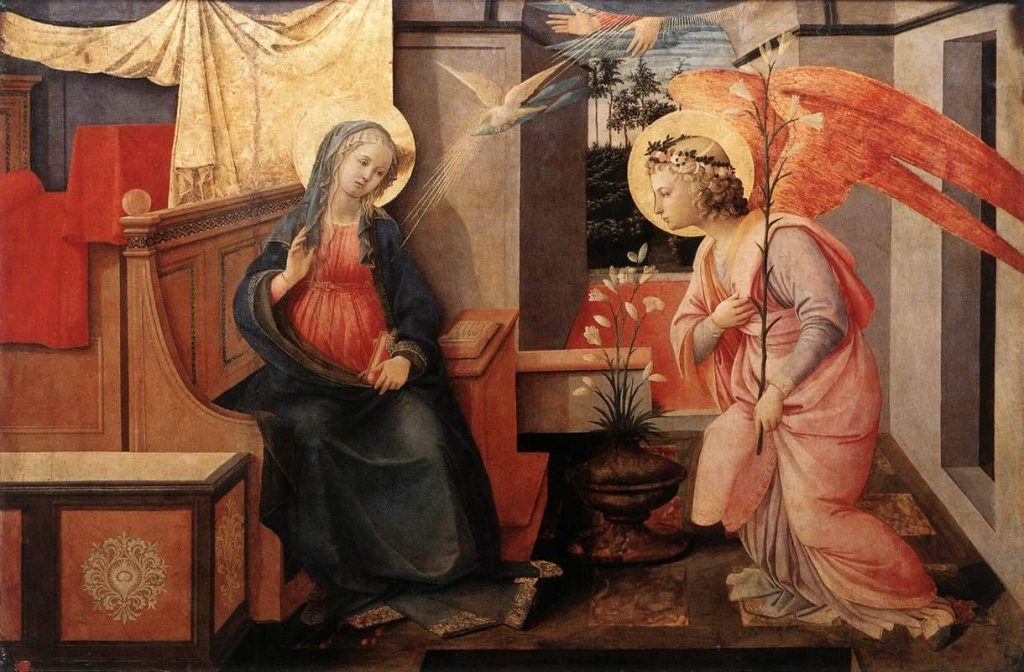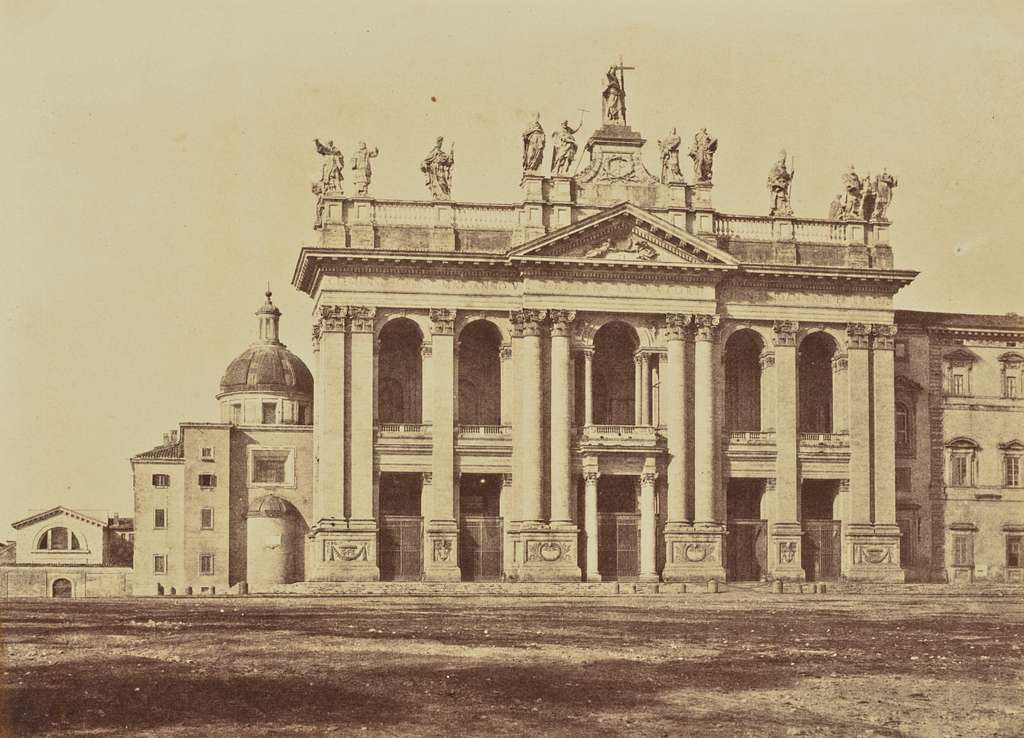Obsculta, o fili (Prologue 1)

PROLOGUE OF OUR MOST HOLY FATHER SAINT BENEDICT TO HIS RULE
1 Jan. 2 May. 1 Sept
Hearken, O my son, to the precepts of thy Master, and incline the ear of thine heart; willingly receive and faithfully fulfil the admonition of thy loving Father, that thou mayest return by the labour of obedience to Him from Whom thou hadst departed through the sloth of disobedience. To thee, therefore, my words are now addressed, whoever thou art that, renouncing thine own will, dost take up the strong and bright weapons of obedience, in order to fight for the Lord Christ, our true king. In the first place, whatever good work thou beginnest to do, beg of Him with most earnest prayer to perfect; that He Who hath now vouchsafed to count us in the number of His children may not at any time be grieved by our evil deeds. For we must always so serve Him with the good things He hath given us, that not only may He never, as an angry father, disinherit his children, but may never, as a dreadful Lord, incensed by our sins, deliver us to everlasting punishment, as most wicked servants who would not follow Him to glory.
The Holy Rule opens with a pressing invitation to hearken. The invitation to hearken is not addressed to a nameless, faceless body of readers. It is, rather, a personal invitation addressed to a single son, as if if were the only son. Obsculta, o fili. Hearken, O my son. The Latin obsculta, or ausculta, means to listen, but also to heed, and to obey. The English word hearken contains the word hear, the word ear, and the old word English word, ken, which means to know. English translations of the Bible often use the word hearken; it means to listen; to lend the ear; to attend to what is uttered; to give heed; to hear, in order to obey or comply.
If thou wilt hear the voice of the Lord thy God, and do what is right before him, and obey his commandments, and keep all his precepts, none of the evils that I laid upon Egypt, will I bring upon thee: for I am the Lord thy healer. (Exodus 15:26)
The word ausculta (in the singular imperative form) appears most frequently in the book of Job:
Audi igitur, Job, eloquia mea,et omnes sermones meos ausculta.
Attend, Job, and hearken to me: and hold thy peace, whilst I speak. (Job 33:1)
Si habes ergo intellectum, audi quod dicitur,et ausculta vocem eloquii mei.
If then thou hast understanding, hear what is said, and hearken to the voice of my words. (Job 34:16)
Ausculta hæc, Job: sta, et considera mirabilia Dei.
Hearken to these things, Job: Stand, and consider the wondrous works of God. (Job 37:14)
There is also in Psalm 44, a verse that the liturgy and the Fathers have long applied to the Blessed Virgin Mary, particularly in reference to the mystery of the Annunciation:
Audi, filia, et vide, et inclina aurem tuam; et obliviscere populum tuum, et domum patris tui.
Hearken, O daughter, and see, and incline thy ear: and forget thy people and thy father’s house. (Psalm 44:11)
The resonance of the opening of the Prologue with this verse of Psalm 44 is evident. Where the psalm has Inclina aurem tuam, “incline thy ear”, Saint Benedict says, Inclina aurem cordis tui, “Incline the ear of thine heart. Saint Chrysippus of Jerusalem (405–479), was a Cappadocian of the fifth century who, having entered the monastery of Saint Euthymnius in Palestine, rose to become the Keeper of the Cross at the Church of the Holy Sepulchre in Jerusalem. Called upon to preach to the monks in service there a sermon in praise of the Virgin Mary, Chrysippus took Psalm 44 as his subject, placing the verse Audi, filia (Hearken, O daughter) in the mouth of the heavenly messenger, the archangel Gabriel:
“My discourse is addressed to you”, he says, turning to Mary, “to you who must go as bride to the great sovereign; to you I address my discourse, to you who are about to conceive the Word of God in the way that he knows. . . . Listen, O daughter, give ear to my words; indeed, the auspicious announcement of the world’s redemption is coming true. Listen, and what you will hear will gladden your heart. . . . Forget your own people and your father’s house: pay no attention to your earthly parents, for you will be transformed into a heavenly queen. And “listen”, he says, “to how much the One who is Creator and Lord of all things loves you”. Indeed, the “king”, he says, “will desire your beauty”; the Father himself will take you as bride; the Holy Spirit will arrange all the conditions that are necessary for these nuptials. . . . Do not believe you will give birth to a human child, for he is your Lord and you will adore him. Your Creator has become your child; you will conceive and with all the others, you will worship him as your Lord. (Marian Texts of the First Millennium, I, Rome, 1988, pp. 605-606)
This text of the 5th century, authorises us, I think, to find in the first words of the Prologue a key that opens for us a Marian hermeneutic of the Holy Rule. It has often been repeated that the Blessed Virgin Mary is entirely absent from the Rule of Saint Benedict, and that her name is nowhere mentioned in it. The Blessed Virgin Mary is, however, everywhere present in the Rule, but she is present there in the manner described by Gerard Manley Hopkins in his poem, The Blessed Virgin Mary Compared to the Air We Breathe:
I say that we are wound
With mercy round and round
As if with air: the same
Is Mary, more by name.
She, wild web, wondrous robe,
Mantles the guilty globe,
Since God has let dispense
Her prayers his providence:
Nay, more than almoner,
The sweet alms self is her
And men are meant to share
Her life as life does air. . . .
Be thou then, thou dear
Mother, my atmosphere;
My happier world, wherein
To wend and meet no sin;
Above me, round me lie
Fronting my froward eye
With sweet and scarless sky;
Stir in my ears, speak there
Of God’s love, O live air,
Of patience, penance, prayer:
World-mothering air, air wild,
Wound with thee, in thee isled,
Fold home, fast fold thy child.
The opening of the Prologue is, implicitly, an invitation to enter deeply in the Marian grace of monastic life: a identification with Our Lady in her virginal readiness; in her intent listening to the Word of God; and in her reception of the Word of God so completely that the Word not only entered through her ears, but descended into her heart and took flesh in her womb by the overshadowing of the Holy Ghost. Not for nothing do the Blessed Fra Angelico, Fra Filippo Lippi and painters of the Flemish school depict the Virgin of the Annunciation straining upward and forward to attend to the Word, even while she holds, either open on her lap, or closed with her finger marking the page, the book of the Scriptures.
There is a certain desiccated, positivistic, hermeneutic of the text of the Rule, that derives more from the historical-critical method than from a humble listening to the voices of the saints who, through the ages, lived the Rule and, in some way, gave it flesh. We cannot, of course, lay aside the fruits of scientific scholarship that, by identifying its sources, allow us to understand the Rule as a text. At the same time, for us, it is not a question merely of “the Rule of Benedict” as so many today like to refer to it; for us, it is always a question of the Holy Rule, that is of the Rule that is holy in its original inspiration, holy in its transmission by generations of saints, and holy in the lives that it has informed and shaped through the ages.
When we refer to the Holy Rule, we are saying that the monk who listens to it attentively day after day, and humbly seeks to live out what he heard, will find himself reflecting the holiness that shines from the Blessed Virgin. Mary Most Holy is the shining icon of monastic holiness. The ancients used to say, Maria, Regula Monachorum, that is, if you would know what it means to be a monk, look to Mary, contemplate Mary, imitate Mary in the listening that was hers at the Annunciation; in the irrepressible praise that rose to God in her Magnificat; in her giving birth to the Word made flesh at Bethlehem; in her keeping the Word in the silence of her heart; in her offering of the Child Christ in the temple; in her seeking Him after three days in Jerusalem; in her eager listening to every word that fell from His lips; in her intercessory prayer at the wedding of Cana; in her vigil of heart–wounding compassion at the Cross of Jesus; in her solitude on Holy Saturday; in her joy at the Resurrection; in her wonder at the Ascension; in her persevering prayer in the Cenacle; in her “becoming all fire” at Pentecost; in her maternal presence in the life of the infant Church; and in the mystery of her Assumption into heaven, whence, “hid with Christ in God” (Colossians 3:3), she reigns as Queen, and bends over this world as Mother.
Be thou then, thou dear
Mother, my atmosphere;
My happier world, wherein
To wend and meet no sin;
Above me, round me lie
Fronting my froward eye
With sweet and scarless sky;
Stir in my ears, speak there
Of God’s love, O live air,
Of patience, penance, prayer:
World-mothering air, air wild,
Wound with thee, in thee isled,
Fold home, fast fold thy child.

